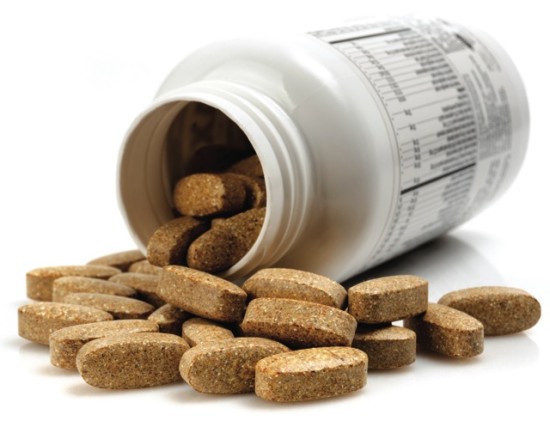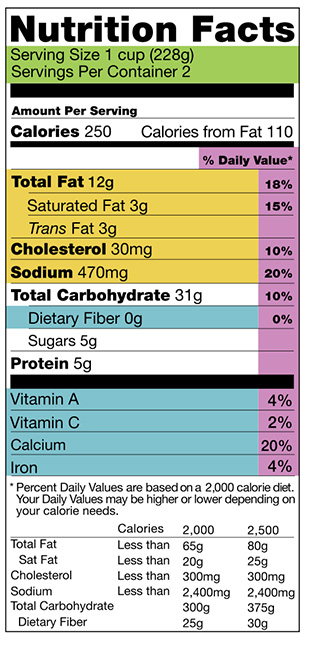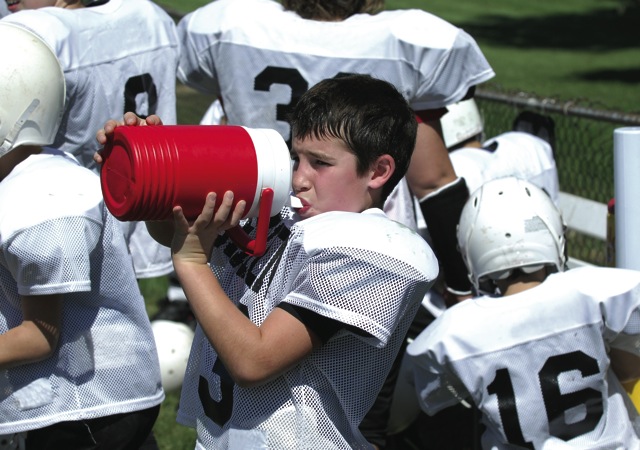Nutritional Value: Eat well to stay well
How many times have you helped an athlete get into terrific shape, only to have them come down with a cold the week before an important match or game?
Or perhaps certain student-athletes seem to get knocked off track every season by strep throat or the flu. Are workouts to blame?

You’re not alone if you’ve observed athletes being particularly vulnerable during periods of hard training or immediately before or after important competitions. This often encourages athletes to consume large doses of nutrients commonly believed to strengthen the immune system, such as vitamin C, zinc or glutamine, in hopes of preventing a run in with the sniffles.
Another misguided and potentially harmful strategy, often suggested by well-meaning parents and coaches, is to load up on the popular herbal Echinacea as soon as the “cold” season begins. You and your athletes may have overlooked one of the simplest, but most effective means (along with frequent hand-washing) of bolstering the immune system. Having athletes pay attention to what they eat and when they eat can have dramatic effects on their abilities to thwart the common cold and other URTIs.
Exercise immunology
Despite the supposed protective effect of exercise, the immune systems of athletes are surprisingly similar to those of non-athletes. Immunologists have found that it’s after exercise — particularly following prolonged, intense bouts — that adverse changes are exhibited. The immune system is suppressed at this critical time, and this downturn can last anywhere from several hours to a few days.
Depending on other factors, such as poor eating habits, inadequate sleep and mental stress, an intense or lengthy exercise bout could serve as the final blow to an already overtaxed immune system. Viruses and bacteria can more easily gain a foothold at this time, disrupting training and competitive plans.
The Power of carbohydrates
Despite testimonials from famous sports figures and overzealous manufacturers, scientists have found little conclusive evidence that vitamin C, zinc, glutamine or other popular supplements like Echinacea can influence an immune system suppressed by prolonged, intensive exercise. Scientists have found one thing, however, that can turn it around — consuming carbohydrates during exercise.
Consuming carbohydrates during exercise appears to boost the immune system by preventing precipitous dips in blood sugar. A low blood sugar level causes the body to release large quantities of stress hormones, particularly cortisol. Typically elevated after prolonged or intense exercise, cortisol profoundly suppresses immune function. In other words, take in carbohydrates and keep your blood glucose steady during exercise and your cortisol levels will be significantly lower. That might just be the edge an athlete needs to keep a cold, sore throat or the flu at bay.
For training sessions lasting an hour or less, having athletes rehydrate with plain water during the workout should be sufficient. The key is to have athletes follow that by eating a balanced meal composed of complex carbohydrates, healthy fats and protein-rich foods as soon as possible, ideally within an hour.
For training sessions lasting longer (especially past the critical 90-minute threshold) or on days athletes are tackling a particularly strenuous workout, coach them to consume a sports drink during and immediately following exercise. This will prevent, or at least help delay, dehydration, glycogen (stored carbohydrate used to fuel muscles and the brain) depletion and a low blood sugar level, all of which are interpreted by the brain as stressful.
Day-to-day counter measures
To take it one step further, have athletes assess their daily energy or caloric intake pattern. In other words, the manner in which they consume and disperse calories throughout the day, as this greatly affects the immune system. Besides feeling better and having more energy to train, athletes who avoid going long periods of time without eating benefit from having more robust immune systems.
 A typical pattern demonstrated by high school and collegiate athletes, however, is to under-eat during the day followed by back-loading calories in at night, after they’re done exercising. Unfortunately, this means the athlete is not in energy balance during the day. Besides doing little to positively fuel the athlete for the day’s upcoming workout, this way of eating stresses the immune system. Blood glucose will inevitably cycle up and down like a roller coaster as the body attempts to compensate for an inconsistent supply of carbohydrate.
A typical pattern demonstrated by high school and collegiate athletes, however, is to under-eat during the day followed by back-loading calories in at night, after they’re done exercising. Unfortunately, this means the athlete is not in energy balance during the day. Besides doing little to positively fuel the athlete for the day’s upcoming workout, this way of eating stresses the immune system. Blood glucose will inevitably cycle up and down like a roller coaster as the body attempts to compensate for an inconsistent supply of carbohydrate.
To normalize blood sugar during the day, athletes need to closely balance the calories they consume with the calories they’re expending through physical activity, which includes sitting in class, walking or participating in gym. This translates into thinking about energy needs on an hour-to-hour basis, not just from day to day.
Educate and support athletes on their commitment to establishing high performance eating habits, which hinge on eating every three to four hours while awake. The goal is to consume three meals and two snacks daily, though some athletes may require three snacks.
Be a good role model as you assist athletes in planning ahead and having healthy options on hand so they don’t raid the nearest vending machine or look to potentially harmful caffeinated energy drinks for a boost. When traveling, select dining options, including fast food eateries, which feature healthy options and prioritize refueling ahead of other activities.
Nutritional Value is a column that focuses on athlete health and wellness. It appears regularly in Coach & Athletic Director magazine.





